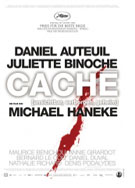

Opening 26 Jan 2006
Directed by:
Michael Haneke
Writing credits:
Michael Haneke
Principal actors:
Daniel Auteuil, Juliette Binoche, Maurice Bénichou, Annie Girardot, Bernard Le Coq
Michael Haneke’s new film is an excellent and timely reminder that money and status may insulate you but they do not make you invulnerable. George (Daniel Auteuil) and Anne (Juliette Binoche) Laurent play the typical Parisian two-income intellectual bourgeois couple to perfection. George is a successful television talk show host who is affable and intelligent. Auteuil plays him at ease but not smug or plastic. Anne works in publishing, but she goes through life looking out for her family and indifferent to her appearance. Such is Binoche’s talent that you actually forget how lovely she is. Their friends are attractive, intelligent, and expensively dressed. Until the videotapes began arriving, the Laurent’s world would appear to have been a round robin of media events, book launches, school events and dinner parties. There is nothing particularly alarming about the tapes in and of themselves. Haneke is too clever for visual terror. Such images provoke fear only within George and Anne because someone is watching them without their consent. The police department’s indifference to their plight, in the absence of any attempted or actual physical harm, remind George and Anne that there are things from which no institutions can protect you. Feeling caged, they bicker at each other. Comfort gives way to recriminations, distrust, lies. On his own, George must grapple with life and set aside his TV persona. Following the clues, George is forced to remember his childhood outside Paris in 1961. He reckons with his past and discovers that no action exists without a reaction. Life does not stay “outside” the confines of our four walls or gated enclosure because we lock the door. Immigrants don’t stop emigrating simply because we build bigger fences or lock them in prisons or worse. Crime, misery, poverty don’t disappear simply because we don’t think about them. With Caché Haneke has demonstrated he knows his audience. Hence the power of Caché: reliable cars, safe neighborhoods, nice friends are no match for the destructive power of our own actions past, present and future if we are not prepared to take responsibility for them. (Rita Pearson Schwandt)
Director Michael Haneke very cunningly develops this relatively simple story. He throws out small clues, one at a time, leaving you anxious about the next piece of the puzzle. Sometimes the puzzle pieces don’t fit. Another Haneke film, Time of the Wolf, had a similar troubling undercurrent with people trying to solve a riddle in order to become the masters of their fates. He upsets people’s feeling of control, probably one of the most basic needs of human nature. Haneke also weaves in the unfamiliar, true story of October 17, 1961, when 200 Algerians were murdered by the Parisian police and thrown into the Seine. The film Georges had an Algerian playmate whom his parents planned to adopt, but didn’t.
Film director Mahmood Behrazhia noticed, “There is no music in the film.” No swelling violins announce anxiety, hope, relief or desperation. It’s all in the script and the pictures. Haneke keeps some puzzle pieces for himself, leaving you to think about the topic of childhood liability. (A similar topic of childhood guilt is treated in the best seller The Kite Runner.) This excellent film, which won the 2005 prize for best European film, is highly recommended to anyone interested in serious cinema. (Becky Tan)